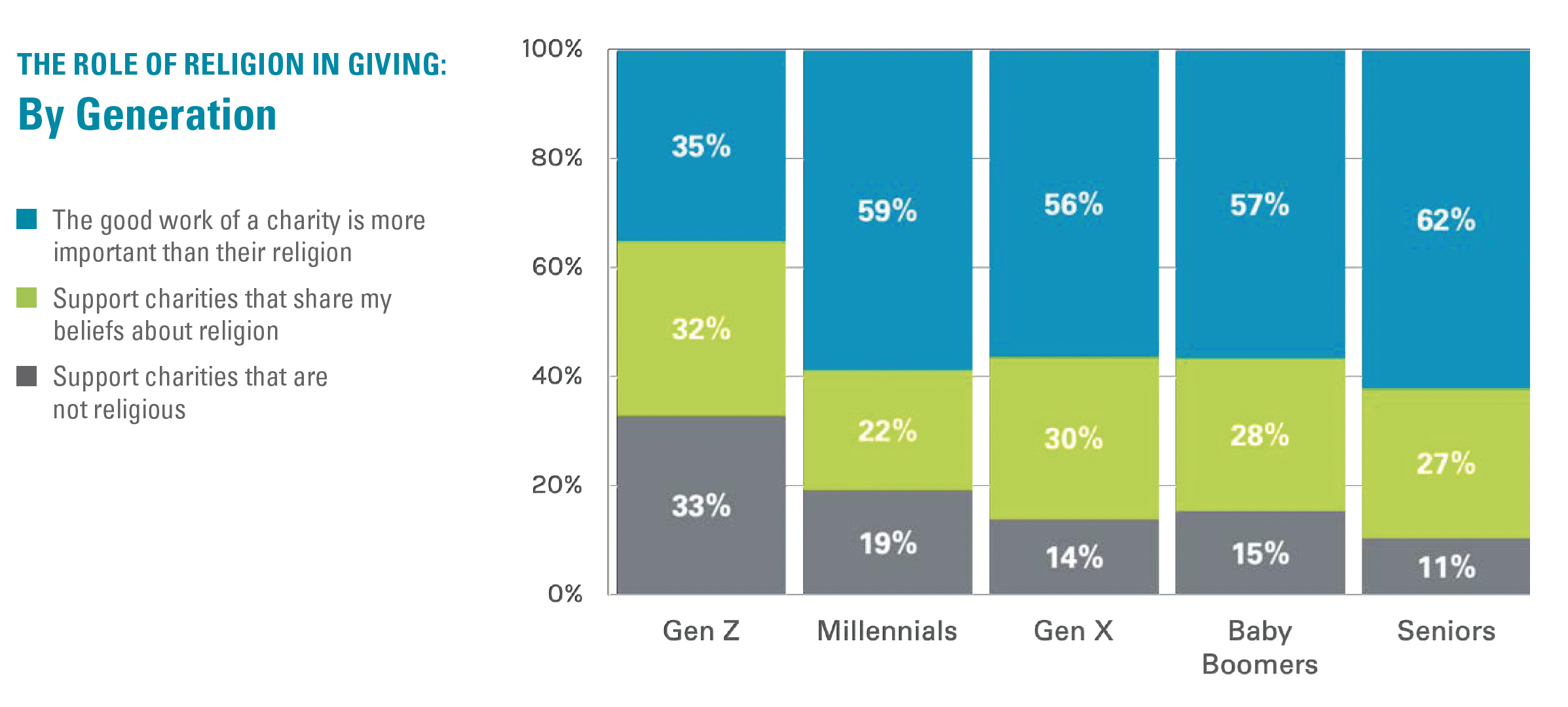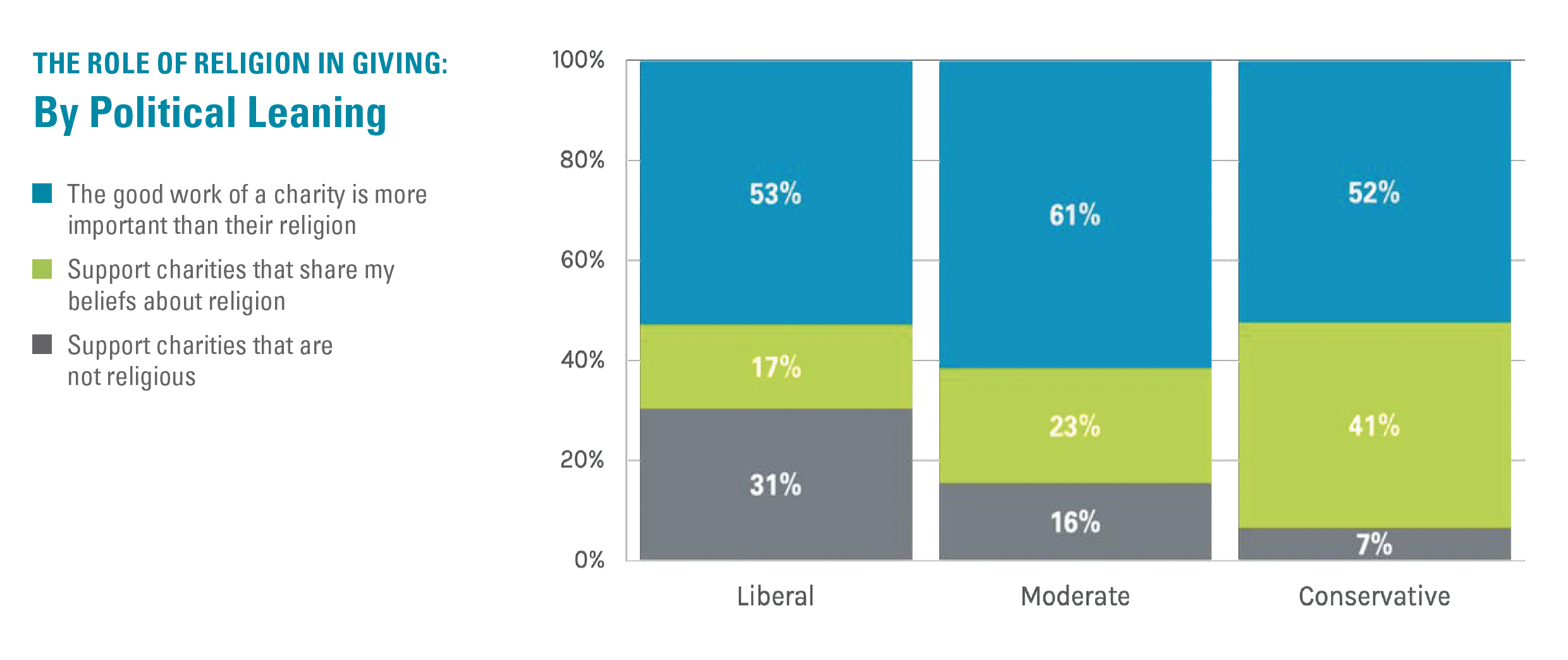
What Divides and Unites Us in Charitable Giving
Our political and religious divide seems wider than ever before.
But, when it comes to charitable giving, people of varied political and religious affiliations can come together in support of many causes. While we may have different beliefs and values, don’t we all have a desire to make a positive impact on the world around us?
These Divisive Times
There is much talk of the divisiveness in today’s political climate. There seems to be a lack of tolerance in accepting viewpoints that are different from one’s own — not just different from cultural norms.
Historically, religion held a prime spot for dividing “us” from “them.” It was a factor in the splitting of countries, the geographical migrations of groups seeking religious freedom and expression, and even presidential races, as seen in JFK’s September 1960 campaign speech. Addressing his characterization in the press about being the “Catholic candidate” to a group of Southern Baptist clergy in Houston, he said, “I am the Democratic Party’s candidate for president, who happens also to be a Catholic.”
Today, the idea that JFK had to overcome religious bias feels foreign. In the current social climate, has political intolerance replaced religion intolerance?
What Divides and Unites Us in Charitable Giving The Role of Religion and Politics in Giving
We investigated the topic with the lens of human services organizations: charities that feed, clothe, and provide services for those experiencing homelessness and/or addiction. Many, but not all, of these organizations — including The Salvation Army, Catholic Charities, and Rescue Missions — are rooted in religion. Other social good organizations or foundations have their origins in politics due to being established by political firebrands.
How does the religion and politics of the charitable organizations themselves influence who supports them? Do only charitable donors of religion give to religious organizations? How do politics compare, and what inferences can we make about the two?
The Role of Religion in Giving
 According to multiple studies of charitable donors, including including our own study, the majority of charitable donors (56%) prioritize the good work of an organization over that organization’s religious beliefs. Another 27% of charitable donors say that it’s important to them that they support charities that share their beliefs about religion. And the remaining 17% say that it’s important to them that they support charities that are not religion based.
According to multiple studies of charitable donors, including including our own study, the majority of charitable donors (56%) prioritize the good work of an organization over that organization’s religious beliefs. Another 27% of charitable donors say that it’s important to them that they support charities that share their beliefs about religion. And the remaining 17% say that it’s important to them that they support charities that are not religion based.
Females are more likely than males to prioritize good work over matching religion. Across multiple studies and years, females are five to nine percentage points more likely than males to fall into this category.
Prioritizing good work over matching religion increases with age, with Millennial and older donors aligned: 58% of donors in their late 20s and older prioritize good work, versus just 35% of Gen Z.

Not surprisingly, political moderates tend to be most tolerant of religious affiliations and prioritize good works over alignment with their own religious beliefs. This insight begs for additional analysis on the role personal politics play in evaluating charities to support.

The Role of Politics in Giving
 A corresponding question from our research looked at the politics of the organization or its founders, versus its religious affiliation. Importantly, these charitable organizations were described as being outside of a political campaign. An example of this is the Stand Together Foundation, which has provided programs addressing poverty since its founding by controversial businessman and philanthropist Charles Koch.
A corresponding question from our research looked at the politics of the organization or its founders, versus its religious affiliation. Importantly, these charitable organizations were described as being outside of a political campaign. An example of this is the Stand Together Foundation, which has provided programs addressing poverty since its founding by controversial businessman and philanthropist Charles Koch.
Compared to religion, charitable donors are less tolerant of political differences in the social good organizations they support. A slight plurality — 41% — do feel that the good works of an organization are more important than political founding or beliefs. However, this is substantially lower than the religious tolerance shown above, where 56% of charitable donors prioritized good works over the religion of the nonprofit.
As in the role of religion in giving, moderates tend to be most tolerant of political affiliations and prioritize good works over alignment with their own political leaning.
Close to half (49%) of Gen Z donors say an organization’s good work outweighs their political beliefs. As age increases, so does political aversion, which is the opposite of what we found with religion.

Religious Tolerance Is Higher Than Political Tolerance
As it relates to evaluating charities to support, Americans are more tolerant of religious differences than they are political differences, with 56% prioritizing good works over the religion of the charity vs. 41% prioritizing good works over the political affiliation of the organization’s founders. For charitable organizations with a prominent and politically active founder, this can create a headwind in generating support for non-partisan causes. Interestingly, religious tolerance in charities increases with age, along with political aversion.
Want more resources like this delivered straight to your inbox?
Access new fundraising research, best practices, white papers, insight reports, and case studies from TrueSense.
What Unites Us in Giving
Sometimes, focusing on what we as humans have in common is more powerful than our differences. At its core, philanthropy unites us as humans. When looking at both sides of the political aisle — shades of both liberal and conservative — we see a humanistic picture emerge. Both sides are charitably minded, with similar support rates and dollars. Bigger differences in charitable giving exist by household income and age according to the longitudinal study.1
In terms of the reasons why donors give, both liberal and conservative donors have the same #1 motivation: feeling a responsibility to give back or tithe.2 Notably, this cause gained five points to land in the top spot this year, perhaps as a result of the widening wealth gap in America.
Other giving motivations that are equal between liberal and conservative donors are:
- Supporting causes that have a personal connection is a top cause among all donors, at 21%. Both sides of the political aisle have similar sentiment, which tends to increase with age/experience.
- Wanting to address and impact needs in their local community, cited by 14% of both groups.
- To feel a connection to a cause or community is cited as the primary reason for giving for 11% of all donors, with little difference between political views.
Ideally, we can identify and build on areas of commonality toward making 2024 a year that has less division and more humanity. Given that 2024 is a presidential election year, the challenge is formidable. For fundraisers, a focus on the elements of connection and community is a worthwhile pursuit during an election year, as the concepts resonate at a human level, avoiding the political divide.
The world is at a critical juncture for coming together since the Israel-Hamas war was declared in early October 2023. Notably, there appears to be more unity displayed on both sides against a common enemy: violence against innocents. In a recent NPR interview between spiritual leaders Rabbi Sharon Brous and Imam Mohamed Herbert, their compassion toward the suffering of each of their communities feels novel, hopeful, and human. It’s up to us to choose the same path.
Notes:
1. There is a correlation between age and political leaning. Liberal-leaning donors have a median age of 44, and conservative-leaning donors have a median age of 55.
2. Note that the terms “giving back” and “tithing” are purposely combined for this response. While each term resonates more with the left and right respectively, they have a similar root. That said, “tithing” is the more salient term, and with its religious connotation, it’s no surprise that conservative donors have a higher alignment with this motivation, at 28%, or six points higher than liberal-leaning donors.
The source for all graphs is TrueSense Marketing's study 2022. Base: U.S. charitable donors, n=1,202.
